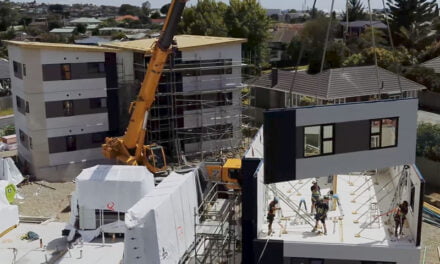As yet another major West Australian construction firm goes under, subcontractors are asking that governments step in to stop them being left hundreds of thousands of dollars out of pocket.
Louise Stewart is a woman with a mission. As spokesperson for the Australian Subcontractor Association, she battles for the rights of the million or so independent contractors who keep the country growing. But the past year has been a frustrating one. A government-run and -funded review has set out an excellent set of protections for subcontractors, yet there has been no follow-up action to implement them. And, in her home state of Western Australia, yet another major firm in the construction sector – RCR Tomlinson – has gone bust, which has left a string of creditors, many of them small operations that cannot absorb the loss.
“In May 2018, the Commonwealth Government made public the Murray Review (National Review of Security of Payments Laws (2018)),” Stewart says. “John Murray is highly respected in the building industry, a previous CEO of Master Builders Australia. He wrote a very well-balanced report and he made a set of excellent recommendations. And yet, to date, nothing has been done with them.”
The two key reforms that Stewart is eager to see implemented are cascading statutory trusts and harmonisation of laws across the country. “Currently, we have a two-tiered system,” Stewart says. “We have the East-Coast model of laws for most of the country, and the West-Coast model of laws in place in WA and the NT. Unfortunately, subcontractors based on the West-Coast model are severely disadvantaged in being able to enforce their payment rights. They don’t have the most basic right: a statutory right to payment.
“It causes all sorts of problems in WA with delayed payments, and then in the event of an insolvency, as with RCR, we have some subcontractors over here that haven’t been paid in 12 months. That is not a situation you would see on the East Coast.”
Of course, even though the situation is better on the other side of the continent, it’s not perfect. Queensland’s new Building Industry Fairness Act (see Solving subcontractor woes at the end of this article) is currently rolled out only for government projects (it’s slated to expand to private industry early this year) and extends only to first-tier subcontractors.
“The protections don’t extend down the chain,” warns Stewart. “A builder will be paid by the government client and there’s transparency over them paying their subcontractors, but then that’s where the transparency ends. But we know a lot of the problems can be at that second level.”
Stewart is keen to see the Murray Review’s recommendation to introduce cascading statutory trusts followed through with. “It says every level that has subcontracts – it’s currently based on a value of over $1 million, but our thoughts are that it actually should apply to anyone who is collecting money on behalf of anyone else – has a responsibility to hold that money in trust and pay it to the people who have actually done the work.”
There is a current plan to cascade the requirement in Queensland, which has Stewart’s full approval.
In the lurch
One man who has been on the receiving end of the problem is Michael Cross, director of Bunbury-based Picton Civil. “This particular year, we hit a bad one,” Cross says. “We had several companies go broke, one of them for the second time. They did us for about $168,000 some years ago and then they opened up again and we lost about $80,000 with them earlier this year. Then we did about $120,000 with RCR Tomlinson, and another $15,000 with a company that went broke on a government contract and the same on another small contract, plus more. So that’s about $240,000 this calendar year.
“We’re a pretty big company, our annual turnover is about $10 million, so it’s about 2.5% of our turnover in bad debts. But for a small business, that can be the end.”
While acknowledging that some of the problems have arisen out of a state-wide economic downturn, Cross points out that ethics also play an important role in the problem, mentioning one firm Picton Civil subcontracted for that made several variations, yet stuck to the original order number for the contract. “The variations weren’t even looked at. They don’t care if subcontractors lose their house, and yet they’ve got all the money in the world. They just look for ways not to pay.”
On the other hand, some firms provide a model of policy. Cross says, “We did work on the alumina project at Worsley, which was a $2 billion job. South32, a BHP spinoff, was the client and they subcontracted Bechtel to manage it for them. We were working for a couple of tiers below that, a company called Simaco, that had a $10–15 million-dollar job. Bechtel made them sign a guarantee that they would not be paid out until they had a letter from every subcontractor to say they had been paid. Bechtel held the money so that the subcontractors would be protected.”
Cross believes that government contracts, and eventually private ones, should be run along similar lines. “We need to bring in legislation where companies given big government contracts have signed off that they’ve paid all their subcontractors before the government gives them the last of their money. And if the company’s not big enough to do that, if they say ‘we need the money to pay our bills’, then don’t give them the job!”
Project Bank Accounts
One similar tool that is currently used to protect subcontractors in Australia is Project Bank Accounts (PBAs). These are a set of accounts that function like a trust and are separate to the head contractor’s ordinary bank account.
Payments from the principal are deposited into a PBA and are then made accessible to subcontractors, who can make payment claims. Subcontractor retention payments are also held as part of the PBA, as may a disputed funds trust account. This protects the retention and disputed monies in the case of a head contractor’s collapse, and only subcontractors and the head contractor can be paid from a PBA, protecting that money from other creditors.
While they offer a decent level of protection, they have their own problems. As Stewart says, “Current PBAs present some barriers in their manual nature. Ideally, the industry needs to come up with a technology solution to handle this problem. If something is technology enabled, it means much less administration, a higher level of reporting, and many of the functions become mostly automated.”
At the time of writing, WA only had PBAs in the Department of Building Management and Works for projects over $1.5 million. However, when TTN approached Small Business Minister Paul Papalia for comment, we were informed that a significant expansion of PBAs will come into effect from July 1, 2019. While the cost threshold is not changing, the narrow scope will be replaced by ‘a wide range of Government projects’.
Stewart is pleased that their campaign is having an effect, but knows it will require more. “I think there’s a really important role for industry,” she says. “We need to come together and accept that for this industry to prosper, there needs to be more collaboration on things such as making PBAs work. And there’s also a very important role for government to make sure that there is an appropriate legislative framework in place and to ensure compliance with that.”
Tackling troubles
One problem for subcontractors is that they are the meat in the sandwich. Major contracting firms tend to have big budgets and can fight legal battles, and for waged employees, the unions are ready to wade in when things go wrong.
As Cross says, “When someone does go broke, the unions get on and say ‘we want the employees to get their full payments.’ But no-one ever mentions the subcontractors, While the wage earners might be two weeks behind with their last pay, the subcontractors are sometimes six or more months behind. They have the same commitments, the kids, the payments, mortgages, but they slip under the radar.”
And subcontractors have been suffering in less-dramatic circumstances, too. “Some big building companies are ruthless,” says Cross. “They say, ‘Oh, the job was substandard, we had to get somebody to come and fix it up, and we’re going to take that out of what we owe you. In a lot of cases, it’s a furphy, they just make it up.”
In good news for WA, the McGowan government has announced the establishment of a Subcontractor Support Unit. It will be overseen by the Small Business Commissioner, who will have the power to compel head contractors on government projects to prove payment to subcontractors; shield subcontractors from retribution for lodging complaints by allowing them to be anonymous; conduct random and targeted audits, based on intelligence and tip offs and make recommendations to government to sanction head contractors.
The unit is expected to be operating in the first half of 2019.
With the WA state government improving matters, Stewart hopes the Commonwealth Government will follow suit. “We had 120% support from Craig Laundy when he was the Federal Minister responsible,” she says, “and he was prepared to act at a Commonwealth level. Unfortunately, we had a change of prime minister and then a change of minister and that support has been lost in the shuffle.”
While Stewart acknowledges that state governments have responsibility for industrial legislation she knows they are unlikely to work together without a degree of federal prodding. “The [Commonwealth Government] has all the recommendations there in black and white. Every state government has a very big infrastructure agenda and they are getting massive chunks of money from the Commonwealth to fund those infrastructure agendas. So why doesn’t the Commonwealth Government link that funding to the implementation of appropriate laws across the country?” she asks.
Cross jokes that he is famous for his complaints on the topic, but points out that his company uses subcontractors and their tenders always reflect the reality of that: “We may not be the biggest company, but we’re morally ethical, and that’s why people come back and use us year in, year out. I always say: every small business has the right to make a profit and when I employ someone, I need to know there’s a margin in there for them to make a profit, that’s how it should be.“
Nevertheless, he says, “I’m very confident for the future. I support Louise. It will be nice to know that if you’re a subcontractor for a major contractor working for the government, as long as you do everything right at your end, you’ll be guaranteed a payment.”
Stewart is pleased to see the McGowan government’s recent steps and hopeful the current hiccups in Canberra won’t stand in the way of the Commonwealth taking the lead on this issue again. “Construction is consistently the number one industry that takes the longest to pay. Start here. You’ve already got the fixes, you’ve already got the recommendations, just get moving on it!”
For more details, visit www.asaonline.org.au
Solving subcontractor woes
Across Australia, the problems caused by late payments and no payments to subcontractors affect some 1 million independent contractors and cost the economy about $3 billion a year. They are also the subject of a raft of recent legislation and policy.
Queensland’s Building Industry Fairness (Security of Payment) Act was passed in late 2017. It currently protects tier one subcontractors through Project Bank Accounts (PBAs) and contains a payment claims process that protects all suppliers and subcontractors on a building project, and includes penalties and disciplinary actions. While parts of the Act are yet to commence, along with expansion of PBAs to sub-subcontractors, it is seen as a step in the right direction.
In August 2018, the Commonwealth Government extended its maximum 30-day payment terms to all subcontracting businesses acting within its various agencies and departments. This does not impact most construction-based subcontractors.
Older legislation in New South Wales, Victoria and South Australia guarantees a right to payment for subcontractors and adjudication of disputes.
Western Australia has recently moved to significantly expand PBAs for government projects and establish a Subcontractor Support Unit to aid subcontractors and audit the industry.












